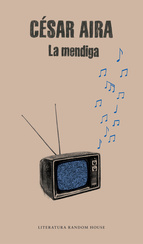Literatura Mondadori
1 primary work • 2 total works
Book 236
En las calles del barrio Flores de Buenos Aires una serie de personajes en situaciones extremas intenta sobrevivir al derrumbe de un país y de sus terribles consecuencias. La crisis argentina obliga a un matrimonio mayor a aceptar un empleo como repartidores de pizzas con horario nocturno. Aldo y Rosita Peyró recorren las calles de Flores, un barrio de Buenos Aires, como dos adolescentes, dispuestos a plantar cara al desastre económico.
En sus recorridos nocturnos ven de cerca las consecuencias directas de la crisis: delincuencia, familias que duermen en la calle, bandas juveniles haciendo destrozos, viejos y niños abandonados, borrachos...
Entre estos personajes y varias situaciones extremas destaca el secuestro y posterior asesinato de un niño, Jonathan, reflejo del horror subterráneo que sacude a toda la sociedad argentina. El caso de Jonathan es el detonante de una serie de actos corruptos en los que están envueltos muchos de los amigos que acompañan a Aldo y Rosita en el reparto. También hay instituciones mezcladas en dicho asunto, pero tal vez, aunque a priori parezca absurdo, un convento sea la clave del misterio..."
ENGLISH DESCRIPTION
In the streets of the Flores neighborhood in Buenos Aires, a series of characters in extreme situations tries to survive the collapse of a country and its terrible consequences.
The Argentinean crisis obliges an older couple to take on a job delivering pizzas at night. Aldo and Rosita Peyró travel the streets of Flores, a neighborhood in Buenos Aires, like two teenagers, ready to face the economic disaster.
In their nighttime journeys, they see up close the direct consequences of the crisis: crime, families sleeping in the street, gangs doing damage, abandoned elderly people and children, drunks, etc.
Among these people and various extreme situations is the kidnapping and subsequent killing of a boy, Jonathan, a reflection of the underground horror shaking all of Argentinean society. Jonathan's case triggers a series of corrupt actions in which many of Aldo and Rosita's pizza delivery colleagues are involved. There are also institutions involved in the mix, but perhaps, though it might seem absurd, a convent could be the key to the mystery...
En sus recorridos nocturnos ven de cerca las consecuencias directas de la crisis: delincuencia, familias que duermen en la calle, bandas juveniles haciendo destrozos, viejos y niños abandonados, borrachos...
Entre estos personajes y varias situaciones extremas destaca el secuestro y posterior asesinato de un niño, Jonathan, reflejo del horror subterráneo que sacude a toda la sociedad argentina. El caso de Jonathan es el detonante de una serie de actos corruptos en los que están envueltos muchos de los amigos que acompañan a Aldo y Rosita en el reparto. También hay instituciones mezcladas en dicho asunto, pero tal vez, aunque a priori parezca absurdo, un convento sea la clave del misterio..."
ENGLISH DESCRIPTION
In the streets of the Flores neighborhood in Buenos Aires, a series of characters in extreme situations tries to survive the collapse of a country and its terrible consequences.
The Argentinean crisis obliges an older couple to take on a job delivering pizzas at night. Aldo and Rosita Peyró travel the streets of Flores, a neighborhood in Buenos Aires, like two teenagers, ready to face the economic disaster.
In their nighttime journeys, they see up close the direct consequences of the crisis: crime, families sleeping in the street, gangs doing damage, abandoned elderly people and children, drunks, etc.
Among these people and various extreme situations is the kidnapping and subsequent killing of a boy, Jonathan, a reflection of the underground horror shaking all of Argentinean society. Jonathan's case triggers a series of corrupt actions in which many of Aldo and Rosita's pizza delivery colleagues are involved. There are also institutions involved in the mix, but perhaps, though it might seem absurd, a convent could be the key to the mystery...
«Un talento personalísimo, un arte poderoso y chocante, embargado siempre por un contagioso, obsesivo, irresistible sentimiento de felicidad.» Ignacio Echevarría, El País
Esta es la historia de Rosa (¿o Iris?), de cómo creció en el barrio porteño de Flores, de las circunstancias que la llevaron a vivir en un pueblo de la provincia de Buenos Aires llamado Brelín, y de las peripecias de su regreso. Y es también la historia de Cecilia, una actriz meticulosa y aplicada convertida en médica de Rosa por obra y gracia de un guión de televisión.
A través de un argumento folletinesco Aira despliega su prosa sabia, vigorosa e irónica, brindando al lector imágenes inolvidables y agudas reflexiones, y, poniendo una vez más sobre el tapete los conceptos de verosimilitud e identidad, exhibe su extraordinaria soltura narrativa, de modo que, como expresa en La mendiga, «la realidad queda al mismo tiempo arriba y abajo de la historia.»
ENGLISH DESCRIPTION "A unique talent, a powerful and shocking art, overloaded with a contagious, obsessive, irresistible feeling of happiness." –Ignacio Echevarría, El País This is the story of Rosa (or Iris?), of how she grew up in the Buenos Aires neighborhood of Flores, of the circumstances that led her to live in a town called Brelín, and of the unexpected turn of events of her return. And it is also the story of Cecilia, a meticulous and hardworking actress who becomes Rosa's doctor thanks to a television script. Through a melodramatic plot, Aira displays his intelligent, vigorous, and ironic prose, offering the reader unforgettable images and sharp reflections. Once again laying out the concepts of authenticity and identity, he shows his extraordinary narrative skill in such a way that, as he says in The Beggarwoman, "reality remains both above and below the story."
Esta es la historia de Rosa (¿o Iris?), de cómo creció en el barrio porteño de Flores, de las circunstancias que la llevaron a vivir en un pueblo de la provincia de Buenos Aires llamado Brelín, y de las peripecias de su regreso. Y es también la historia de Cecilia, una actriz meticulosa y aplicada convertida en médica de Rosa por obra y gracia de un guión de televisión.
A través de un argumento folletinesco Aira despliega su prosa sabia, vigorosa e irónica, brindando al lector imágenes inolvidables y agudas reflexiones, y, poniendo una vez más sobre el tapete los conceptos de verosimilitud e identidad, exhibe su extraordinaria soltura narrativa, de modo que, como expresa en La mendiga, «la realidad queda al mismo tiempo arriba y abajo de la historia.»
ENGLISH DESCRIPTION "A unique talent, a powerful and shocking art, overloaded with a contagious, obsessive, irresistible feeling of happiness." –Ignacio Echevarría, El País This is the story of Rosa (or Iris?), of how she grew up in the Buenos Aires neighborhood of Flores, of the circumstances that led her to live in a town called Brelín, and of the unexpected turn of events of her return. And it is also the story of Cecilia, a meticulous and hardworking actress who becomes Rosa's doctor thanks to a television script. Through a melodramatic plot, Aira displays his intelligent, vigorous, and ironic prose, offering the reader unforgettable images and sharp reflections. Once again laying out the concepts of authenticity and identity, he shows his extraordinary narrative skill in such a way that, as he says in The Beggarwoman, "reality remains both above and below the story."

